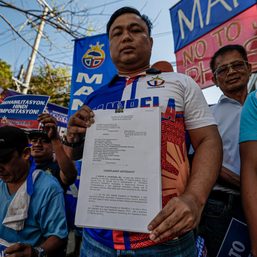SUMMARY
This is AI generated summarization, which may have errors. For context, always refer to the full article.

MANILA, Philippines – The Sandiganbayan, the country’s anti-graft court, has found Janet Lim Napoles, former Davao del Norte 1st District lawmaker Arrel Olaño, and several others guilty of graft and malversation of public funds in connection with the Priority Development Assistance Fund (PDAF) scam.
In a decision made public on Friday, June 30, the anti-graft court’s Second Division found Napoles, Olaño, and Maria Rosalinda Lacsamana guilty of three counts of graft under section 3(e) of Republic Act No. 3019 or Anti-Graft and Corrupt Practices Act. They were sentenced to up to 30 years in prison as maximum penalty, and perpetual disqualification from holding public office.
They were also ordered to indemnify or pay the government jointly a total of P7,720,000 for the three cases, representing the sum of money illegally disbursed.
Evelyn Ditchon de Leon has been convicted for two counts of graft and has been sentenced to up to 20 years in prison, and pay P5,830,000, along with Napoles and others. Mylene Encarnacion was convicted in the first graft case and was sentenced to up to 10 years in prison, and indemnify the government P1,890,000 along with her fellow accused.
De Leon served as the chief of Philippine Social Development Foundation, Incorporated, the bogus nongovernmental organization allegedly founded by Napoles. Lacsamana served as manager of the Technology and Livelihood Information Dissemination services group.
Meanwhile, according to the information, Encarnacion “acted for and in behalf of Napoles,” received the check in relation to PDAF release, “and helped remit the proceeds thereof to Napoles.”
For malversation of public funds, Napoles, Olaño, and Lacsamana were also found guilty for three counts. They were sentenced to up to 40 years, 5 months, 13 days in prison.
De Leon was convicted for two counts and was sentenced to up to 28 years, 5 months, and 12 days in prison. She will also pay P5,830,000, along with Napoles and others. For Encarnacion, she was also convicted for one count and was sentenced to up to 12 years and 1 day and pay P1,890,000 along with her fellow accused.
They were all perpetually disqualified from holding public office.
Meanwhile, the following have been acquitted in the three graft and three malversation cases for failure of the prosecution to prove their guilt beyond reasonable doubt:
- Mario Relampagos
- Rosario Nuñez
- Lalaine Paule
- Marilou Bare
- Dennis Cunanan
- Francisco Figura
- Marivic Jover
- and Maurine Dimaranan
Consuelo Lilian Reyes Espiritu has also been acquitted in the third graft and malversation cases.
Aside from graft and malversation cases, the anti-graft court also found Olaño guilty of direct bribery and sentenced him up to nine years, four months, and one day. He was also ordered to pay a fine of P9,525,000.
In total, Napoles got up to 70 years, 5 months, and 13 days in prison, while Olaño got 79 years, 9 months, 14 days in prison. Associate Justice Edgardo Caldona penned the decision, while the division’s chairperson, Associate Justice Oscar Herrera, Jr. and Arthur Malabaguio had concurred.
The former Davao lawmaker was indicted in the case for allocating money to Napoles’ fake nongovernmental organizations.
”The NGOs however did not actually conduct any regular business activity but were only utilized as conduits for the transfer of public funds that ended up being divided as commissions and/or kickbacks among accused Olaño, Napoles, and TRC officials,” the decision read.
“There was no actual implementation of government projects. There were some instances of under-delivery of goods, but essentially, these were ‘ghost ‘ or non-existent projects. The liquidation of public funds was therefore made up,” the Sandiganbayan added. – Rappler.com
Add a comment
How does this make you feel?










![[OPINION] Jailing Jinggoy](https://www.rappler.com/tachyon/2024/01/tl-jailing-jinggoy.jpg?resize=257%2C257&crop=267px%2C0px%2C720px%2C720px)
There are no comments yet. Add your comment to start the conversation.